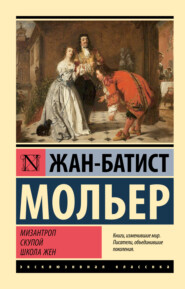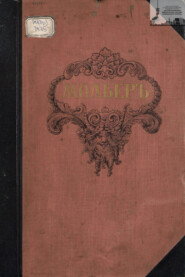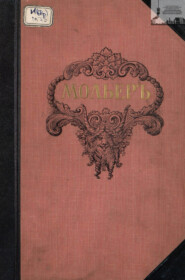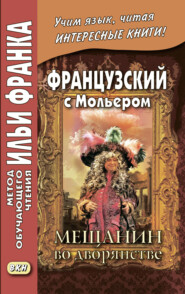По всем вопросам обращайтесь на: info@litportal.ru
(©) 2003-2024.
✖
Tartuffe; Or, The Hypocrite
Год написания книги
2017
Настройки чтения
Размер шрифта
Высота строк
Поля
Tartuffe; Or, The Hypocrite
Жан-Батист Мольер
Molière
Tartuffe; Or, The Hypocrite
INTRODUCTORY NOTE
Jean Baptiste Poquelin, better known by his stage name of Moliere, stands without a rival at the head of French comedy. Born at Paris in January, 1622, where his father held a position in the royal household, he was educated at the Jesuit College de Clermont, and for some time studied law, which he soon abandoned for the stage. His life was spent in Paris and in the provinces, acting, directing performances, managing theaters, and writing plays. He had his share of applause from the king and from the public; but the satire in his comedies made him many enemies, and he was the object of the most venomous attacks and the most impossible slanders. Nor did he find much solace at home; for he married unfortunately, and the unhappiness that followed increased the bitterness that public hostility had brought into his life. On February 17, 1673, while acting in "La Malade Imaginaire," the last of his masterpieces, he was seized with illness and died a few hours later.
The first of the greater works of Moliere was "Les Precieuses Ridicules," produced in 1659. In this brilliant piece Moliere lifted French comedy to a new level and gave it a new purpose – the satirizing of contemporary manners and affectations by frank portrayal and criticism. In the great plays that followed, "The School for Husbands" and "The School for Wives," "The Misanthrope" and "The Hypocrite" (Tartuffe), "The Miser" and "The Hypochondriac," "The Learned Ladies," "The Doctor in Spite of Himself," "The Citizen Turned Gentleman," and many others, he exposed mercilessly one after another the vices and foibles of the day.
His characteristic qualities are nowhere better exhibited than in "Tartuffe." Compared with such characterization as Shakespeare's, Moliere's method of portraying life may seem to be lacking in complexity; but it is precisely the simplicity with which creations like Tartuffe embody the weakness or vice they represent that has given them their place as universally recognized types of human nature.
CHARACTERS
MADAME PERNELLE, mother of Orgon
ORGON, husband of Elmire
ELMIRE, wife of Orgon
DAMIS, son of Orgon
MARIANE, daughter of Orgon, in love with Valere
CLEANTE, brother-in-law of Orgon
TARTUFFE, a hypocrite
DORINE, Mariane's maid
M. LOYAL, a bailiff
A Police Officer
FLIPOTTE, Madame Pernelle's servant
The Scene is at Paris
ACT I
SCENE I
MADAME PERNELLE and FLIPOTTE, her servant; ELMIRE, MARIANE, CLEANTE,
DAMIS, DORINE
MADAME PERNELLE
Come, come, Flipotte, and let me get away.
ELMIRE
You hurry so, I hardly can attend you.
MADAME PERNELLE
Then don't, my daughter-in law. Stay where you are.
I can dispense with your polite attentions.
ELMIRE
We're only paying what is due you, mother.
Why must you go away in such a hurry?
MADAME PERNELLE
Because I can't endure your carryings-on,
And no one takes the slightest pains to please me.
I leave your house, I tell you, quite disgusted;
You do the opposite of my instructions;
You've no respect for anything; each one
Must have his say; it's perfect pandemonium.
DORINE
If …
MADAME PERNELLE
You're a servant wench, my girl, and much
Too full of gab, and too impertinent
And free with your advice on all occasions.
DAMIS
But …
MADAME PERNELLE
You're a fool, my boy – f, o, o, l
Just spells your name. Let grandma tell you that
I've said a hundred times to my poor son,
Your father, that you'd never come to good
Or give him anything but plague and torment.
MARIANE
Жан-Батист Мольер
Molière
Tartuffe; Or, The Hypocrite
INTRODUCTORY NOTE
Jean Baptiste Poquelin, better known by his stage name of Moliere, stands without a rival at the head of French comedy. Born at Paris in January, 1622, where his father held a position in the royal household, he was educated at the Jesuit College de Clermont, and for some time studied law, which he soon abandoned for the stage. His life was spent in Paris and in the provinces, acting, directing performances, managing theaters, and writing plays. He had his share of applause from the king and from the public; but the satire in his comedies made him many enemies, and he was the object of the most venomous attacks and the most impossible slanders. Nor did he find much solace at home; for he married unfortunately, and the unhappiness that followed increased the bitterness that public hostility had brought into his life. On February 17, 1673, while acting in "La Malade Imaginaire," the last of his masterpieces, he was seized with illness and died a few hours later.
The first of the greater works of Moliere was "Les Precieuses Ridicules," produced in 1659. In this brilliant piece Moliere lifted French comedy to a new level and gave it a new purpose – the satirizing of contemporary manners and affectations by frank portrayal and criticism. In the great plays that followed, "The School for Husbands" and "The School for Wives," "The Misanthrope" and "The Hypocrite" (Tartuffe), "The Miser" and "The Hypochondriac," "The Learned Ladies," "The Doctor in Spite of Himself," "The Citizen Turned Gentleman," and many others, he exposed mercilessly one after another the vices and foibles of the day.
His characteristic qualities are nowhere better exhibited than in "Tartuffe." Compared with such characterization as Shakespeare's, Moliere's method of portraying life may seem to be lacking in complexity; but it is precisely the simplicity with which creations like Tartuffe embody the weakness or vice they represent that has given them their place as universally recognized types of human nature.
CHARACTERS
MADAME PERNELLE, mother of Orgon
ORGON, husband of Elmire
ELMIRE, wife of Orgon
DAMIS, son of Orgon
MARIANE, daughter of Orgon, in love with Valere
CLEANTE, brother-in-law of Orgon
TARTUFFE, a hypocrite
DORINE, Mariane's maid
M. LOYAL, a bailiff
A Police Officer
FLIPOTTE, Madame Pernelle's servant
The Scene is at Paris
ACT I
SCENE I
MADAME PERNELLE and FLIPOTTE, her servant; ELMIRE, MARIANE, CLEANTE,
DAMIS, DORINE
MADAME PERNELLE
Come, come, Flipotte, and let me get away.
ELMIRE
You hurry so, I hardly can attend you.
MADAME PERNELLE
Then don't, my daughter-in law. Stay where you are.
I can dispense with your polite attentions.
ELMIRE
We're only paying what is due you, mother.
Why must you go away in such a hurry?
MADAME PERNELLE
Because I can't endure your carryings-on,
And no one takes the slightest pains to please me.
I leave your house, I tell you, quite disgusted;
You do the opposite of my instructions;
You've no respect for anything; each one
Must have his say; it's perfect pandemonium.
DORINE
If …
MADAME PERNELLE
You're a servant wench, my girl, and much
Too full of gab, and too impertinent
And free with your advice on all occasions.
DAMIS
But …
MADAME PERNELLE
You're a fool, my boy – f, o, o, l
Just spells your name. Let grandma tell you that
I've said a hundred times to my poor son,
Your father, that you'd never come to good
Or give him anything but plague and torment.
MARIANE

















